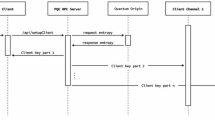Abstract
Blockchain has raised public concern due to its public, distributed, and decentration characteristics. This technique has been applied not only in the financial area, but also in e-government, e-health and many other digital systems. However, the security of the most widely used blockchain technique was built on the elliptic curve cryptography, which will be insecure in the will-coming quantum computing era. In this paper, we propose to use a quantum-resisted digital signature scheme from coding theory instead of ECDSA. More precisely, we modified the well-known WAVE signature scheme from \((U,U+V)\) code into \((U,U+V,U+V+W)\) code, and achieve better performance. With this post-quantum signature scheme, we build a post-quantum blockchain system.
Access this chapter
Tax calculation will be finalised at checkout
Purchases are for personal use only
Similar content being viewed by others
References
Alabbadi, M., Wicker, S.B.: Security of Xinmei digital signature scheme. Electron. Lett. 28(9), 890–891 (1992)
Alabbadi, M., Wicker, S.B.: Digital signature scheme based on error-correcting codes. In: ISIT 1993, Piscataway, pp. 19–29. IEEE (1993)
Barreto, P.S., Misoczki, R., Simplicio, M.A.J.: One-time signature scheme from syndrome decoding over generic error-correcting codes. J. Syst. Softw. 84(2), 198–204 (2011)
Berlekamp, E.R., Mceliece, R.J., van Tilborg, H.C.A.: On the inherent intractability of certain coding problems. IEEE Trans. Inf. Theor. 24(3), 384–386 (1978)
Beullens, W.: Breaking rainbow takes a weekend on a laptop. IACR Cryptology ePrint Archive, Report 2022/214 (2022)
Chalkias, K., Brown, J., Hearn, M., Lillehagen, T., Nitto, I., Schroeter, T.: Blockchained post-quantum signatures. In: 2018 IEEE International Conference on Internet of Things (iThings) and IEEE Green Computing and Communications (GreenCom) and IEEE Cyber, Physical and Social Computing (CPSCom) and IEEE Smart Data (SmartData), Piscataway, pp. 1196–1203. IEEE (2018)
Courtois, N.T., Finiasz, M., Sendrier, N.: How to achieve a McEliece-based digital signature scheme. In: Boyd, C. (ed.) ASIACRYPT 2001. LNCS, vol. 2248, pp. 157–174. Springer, Heidelberg (2001). https://doi.org/10.1007/3-540-45682-1_10
Dallot, L.: Towards a concrete security proof of Courtois, Finiasz and Sendrier signature scheme. In: Lucks, S., Sadeghi, A.-R., Wolf, C. (eds.) WEWoRC 2007. LNCS, vol. 4945, pp. 65–77. Springer, Heidelberg (2008). https://doi.org/10.1007/978-3-540-88353-1_6
Debris-Alazard, T., Sendrier, N., Tillich, J.-P.: Wave: a new family of trapdoor one-way preimage sampleable functions based on codes. In: Galbraith, S.D., Moriai, S. (eds.) ASIACRYPT 2019. LNCS, vol. 11921, pp. 21–51. Springer, Cham (2019). https://doi.org/10.1007/978-3-030-34578-5_2
Debris-Alazard, T., Sendrier, N., Tillich, J.P.: The problem with the surf scheme. Preprint (2017). arXiv:1706.08065
Ding, J., Schmidt, D.: Rainbow, a new multivariable polynomial signature scheme. In: Ioannidis, J., Keromytis, A., Yung, M. (eds.) ACNS 2005. LNCS, vol. 3531, pp. 164–175. Springer, Heidelberg (2005). https://doi.org/10.1007/11496137_12
Gaborit, P., Schrek, J.: Efficient code-based one-time signature from automorphism groups with syndrome compatibility. In: ISIT 2012, Piscataway, pp. 1982–1986. IEEE (2012)
Harn, L., Wang, D.C.: Cryptoanalysis and modification of digital signature scheme based on error-correcting codes. Electron. Lett. 28(2), 157–159 (1992)
Kabatianskii, G., Krouk, E., Smeets, B.: A digital signature scheme based on random error-correcting codes. In: Darnell, M. (ed.) Cryptography and Coding 1997. LNCS, vol. 1355, pp. 161–167. Springer, Heidelberg (1997). https://doi.org/10.1007/BFb0024461
Mceliece, R.J.: A public-key cryptosystem based on algebraic. JPL DSN Prog. Rep. 44, 114–116 (1978)
Li, C., Chen, X., Chen, Y., Hou, Y., Li, J.: A new lattice-based signature scheme in post-quantum blockchain network. IEEE Access 7, 2026–2033 (2019)
Nakamoto, S.: Bitcoin: a peer-to-peer electronic cash system. https://bitco.in/pdf/bitcoin.pdf
Niederreiter, H.: Knapsack-type cryptosystems and algebraic coding theory. Probl. Control Inf. Theor. 15(2), 159–166 (1986)
Prange, E.: The use of information sets in decoding cyclic codes. Ire Trans. Inf. Theor. 8(5), 5–9 (1962)
Sendrier, N.: Decoding one out of many. In: Yang, B.-Y. (ed.) PQCrypto 2011. LNCS, vol. 7071, pp. 51–67. Springer, Heidelberg (2011). https://doi.org/10.1007/978-3-642-25405-5_4
Shen, R., Xiang, H., Zhang, X., Cai, B., Xiang, T.: Application and implementation of multivariate public key cryptosystem in blockchain (short paper). In: Wang, X., Gao, H., Iqbal, M., Min, G. (eds.) CollaborateCom 2019. LNICST, vol. 292, pp. 419–428. Springer, Cham (2019). https://doi.org/10.1007/978-3-030-30146-0_29
Stern, J.: A new identification scheme based on syndrome decoding. In: Stinson, D.R. (ed.) CRYPTO 1993. LNCS, vol. 773, pp. 13–21. Springer, Heidelberg (1994). https://doi.org/10.1007/3-540-48329-2_2
Wang, X.: Digital signature scheme based on error-correcting codes. Electron. Lett. 13, 898–899 (1990)
Xu, S., Doumen, J., van Tilborg, H.: On the security of digital signature schemes based on error-correcting codes. Des. Codes Crypt. 28, 187–199 (2003)
Zhang, X., Wu, F., Yao, W., Wang, W., Zheng, Z.: Post-quantum blockchain over lattice. Comput. Mater. Continua 63(2), 845–859 (2020)
acknowledgements
This work is supported by Guangdong Major Project of Basic and Applied Basic Research (2019B030302008) and the National Natural Science Foundation of China (No. 61972429).
Author information
Authors and Affiliations
Corresponding author
Editor information
Editors and Affiliations
Rights and permissions
Copyright information
© 2022 The Author(s), under exclusive license to Springer Nature Singapore Pte Ltd.
About this paper
Cite this paper
Zhang, Z., Tian, H., Zhang, F. (2022). Improved WAVE Signature and Apply to Post-quantum Blockchain. In: Chen, X., Huang, X., Kutyłowski, M. (eds) Security and Privacy in Social Networks and Big Data. SocialSec 2022. Communications in Computer and Information Science, vol 1663. Springer, Singapore. https://doi.org/10.1007/978-981-19-7242-3_20
Download citation
DOI: https://doi.org/10.1007/978-981-19-7242-3_20
Published:
Publisher Name: Springer, Singapore
Print ISBN: 978-981-19-7241-6
Online ISBN: 978-981-19-7242-3
eBook Packages: Computer ScienceComputer Science (R0)




